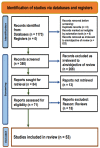Air Pollution and Cognitive Impairment across the Life Course in Humans: A Systematic Review with Specific Focus on Income Level of Study Area
- PMID: 35162428
- PMCID: PMC8835599
- DOI: 10.3390/ijerph19031405
Air Pollution and Cognitive Impairment across the Life Course in Humans: A Systematic Review with Specific Focus on Income Level of Study Area
Abstract
Cognitive function is a crucial determinant of human capital. The Lancet Commission (2020) has recognized air pollution as a risk factor for dementia. However, the scientific evidence on the impact of air pollution on cognitive outcomes across the life course and across different income settings, with varying levels of air pollution, needs further exploration. A systematic review was conducted, using Preferred Reporting Items for Systematic reviews and Meta-Analyses (PRISMA) Guidelines to assess the association between air pollution and cognitive outcomes across the life course with a plan to analyze findings as per the income status of the study population. The PubMed search included keywords related to cognition and to pollution (in their titles) to identify studies on human participants published in English until 10 July 2020. The search yielded 84 relevant studies that described associations between exposure to air pollutants and an increased risk of lower cognitive function among children and adolescents, cognitive impairment and decline among adults, and dementia among older adults with supportive evidence of neuroimaging and inflammatory biomarkers. No study from low- and middle-income countries (LMICs)was identified despite high levels of air pollutants and high rates of dementia. To conclude, air pollution may impair cognitive function across the life-course, but a paucity of studies from reLMICs is a major lacuna in research.
Keywords: PAH; air pollution; cognition; cognitive impairment; dementia; global pollution; health effects/risks; particulate matter2.5 (PM2.5).
Conflict of interest statement
The authors report no conflict of interest. The funders had no role in the design of the study; in the collection, analyses, or interpretation of data; in the writing of the manuscript, or in the decision to publish the results.
Figures





References
-
- Forouzanfar M.H., Afshin A., Alexander L.T., Anderson H.R., Bhutta Z.A., Biryukov S. Global, regional, and national comparative risk assessment of 79 behavioural, environmental and occupational, and metabolic risks or clusters of risks, 1990–2015: A systematic analysis for the Global Burden of Disease Study 2015. Lancet. 2016;388:1659–1724. doi: 10.1016/S0140-6736(16)31679-8. - DOI - PMC - PubMed
-
- Burnett R., Chen H., Szyszkowicz M., Fann N., Hubbell B., Pope C.A., Apte J.S., Brauer M., Cohen A., Weichenthal S., et al. Global estimates of mortality associated with long-term exposure to outdoor fine particulate matter. Proc. Natl. Acad. Sci. USA. 2018;115:9592–9597. doi: 10.1073/pnas.1803222115. - DOI - PMC - PubMed
Publication types
MeSH terms
Substances
LinkOut - more resources
Full Text Sources
Medical

